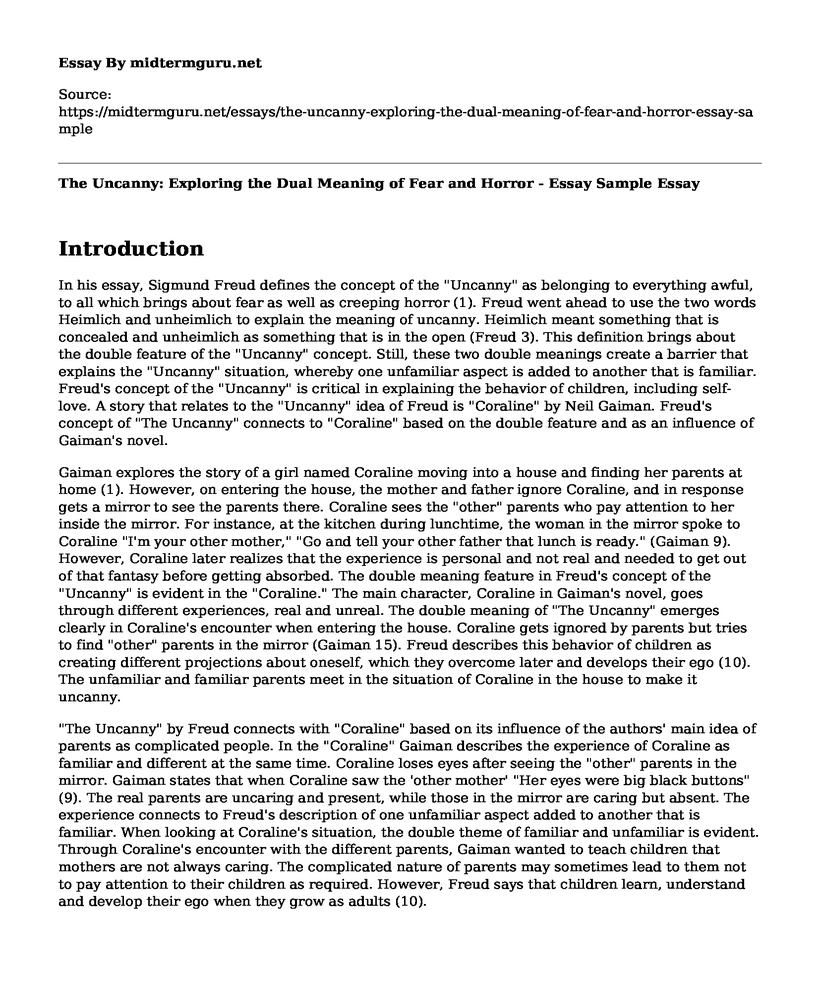Introduction
In his essay, Sigmund Freud defines the concept of the "Uncanny" as belonging to everything awful, to all which brings about fear as well as creeping horror (1). Freud went ahead to use the two words Heimlich and unheimlich to explain the meaning of uncanny. Heimlich meant something that is concealed and unheimlich as something that is in the open (Freud 3). This definition brings about the double feature of the "Uncanny" concept. Still, these two double meanings create a barrier that explains the "Uncanny" situation, whereby one unfamiliar aspect is added to another that is familiar. Freud's concept of the "Uncanny" is critical in explaining the behavior of children, including self-love. A story that relates to the "Uncanny" idea of Freud is "Coraline" by Neil Gaiman. Freud's concept of "The Uncanny" connects to "Coraline" based on the double feature and as an influence of Gaiman's novel.
Gaiman explores the story of a girl named Coraline moving into a house and finding her parents at home (1). However, on entering the house, the mother and father ignore Coraline, and in response gets a mirror to see the parents there. Coraline sees the "other" parents who pay attention to her inside the mirror. For instance, at the kitchen during lunchtime, the woman in the mirror spoke to Coraline "I'm your other mother," "Go and tell your other father that lunch is ready." (Gaiman 9). However, Coraline later realizes that the experience is personal and not real and needed to get out of that fantasy before getting absorbed. The double meaning feature in Freud's concept of the "Uncanny" is evident in the "Coraline." The main character, Coraline in Gaiman's novel, goes through different experiences, real and unreal. The double meaning of "The Uncanny" emerges clearly in Coraline's encounter when entering the house. Coraline gets ignored by parents but tries to find "other" parents in the mirror (Gaiman 15). Freud describes this behavior of children as creating different projections about oneself, which they overcome later and develops their ego (10). The unfamiliar and familiar parents meet in the situation of Coraline in the house to make it uncanny.
"The Uncanny" by Freud connects with "Coraline" based on its influence of the authors' main idea of parents as complicated people. In the "Coraline" Gaiman describes the experience of Coraline as familiar and different at the same time. Coraline loses eyes after seeing the "other" parents in the mirror. Gaiman states that when Coraline saw the 'other mother' "Her eyes were big black buttons" (9). The real parents are uncaring and present, while those in the mirror are caring but absent. The experience connects to Freud's description of one unfamiliar aspect added to another that is familiar. When looking at Coraline's situation, the double theme of familiar and unfamiliar is evident. Through Coraline's encounter with the different parents, Gaiman wanted to teach children that mothers are not always caring. The complicated nature of parents may sometimes lead to them not to pay attention to their children as required. However, Freud says that children learn, understand and develop their ego when they grow as adults (10).
Conclusion
In conclusion, Freud's theory of "The Uncanny" is an influence on Gaiman's novel "Coraline" when looking at the double feature and character experiences. The familiar and unfamiliar aspects of "The Uncanny" situation described by Freud are evident in "Coraline." Even though Gaiman had a different idea in the story, Freud's concept of "The Uncanny" is a massive influence on the work. Through the uncanny situation experienced by Coraline, Gaiman was able to express the idea that parents are complicated human beings. Children must become brave and learn to appreciate and face every situation in life since they cannot have everything.
Works Cited
Freud, Sigmund. "The Uncanny." Trans. Alix Strachey. 1919. web.mit.edu/allanmc/www/freud1.pdf.Gaiman, Neil. Coraline. New York, HarperCollins, 2012.
Cite this page
The Uncanny: Exploring the Dual Meaning of Fear and Horror - Essay Sample. (2023, Jan 24). Retrieved from https://midtermguru.com/essays/the-uncanny-exploring-the-dual-meaning-of-fear-and-horror-essay-sample
If you are the original author of this essay and no longer wish to have it published on the midtermguru.com website, please click below to request its removal:
- Analysis of Emily Dickinsons Poetry
- Analysis of William Shakespeares Tragedy Othello - Paper Example
- Paper Example on Philosophy: Brave New World and Utilitarianism
- Research Analysis of Dan Browns View of Christianity - Paper Example
- Compare And Contrast Essay on "Sleepy Hollow" And Tim Burton's Film
- Essay Sample on Life of Rachel Carson
- Paper Example on Procrastination and its Solutions







